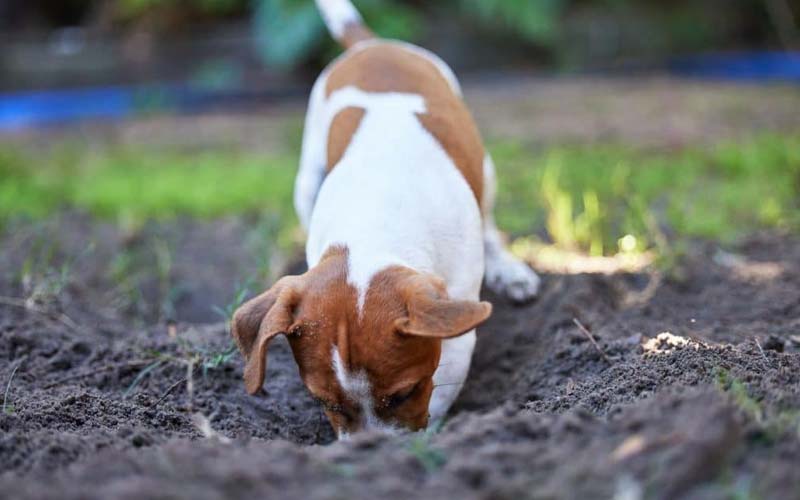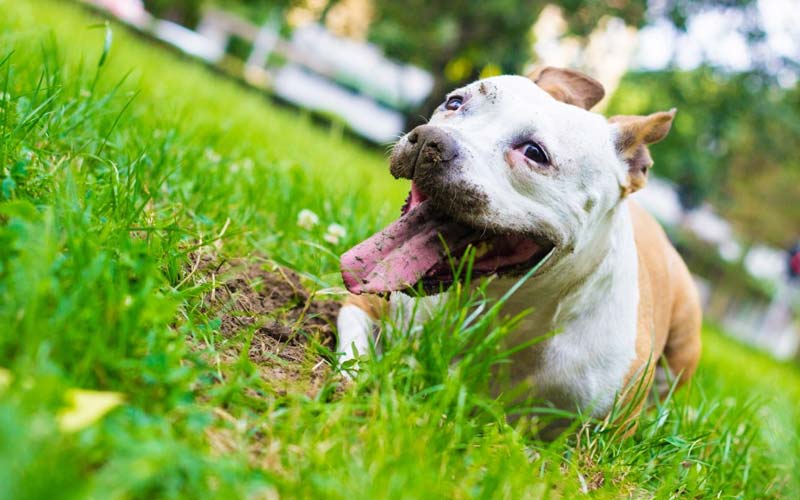Discovering your yard peppered with freshly dug holes can be both perplexing and frustrating for any dog owner. While digging is a natural behavior rooted in your dog’s instincts, a sudden onset of this activity may signal more than just a playful whim. Whether your dog is an enthusiastic digger by breed or has recently developed this habit, understanding the underlying causes is crucial to managing and redirecting their behavior effectively.

Dogs dig for various reasons, ranging from boredom and anxiety to environmental factors or a strong prey drive. In this article, we’ll explore the common triggers behind sudden digging and provide practical solutions to help you address the issue. By understanding why your dog is digging, you can take the necessary steps to ensure their well-being and maintain the integrity of your yard.
1. The Natural Instinct Behind Digging
Ancestral Roots
Digging is deeply ingrained in the natural instincts of dogs, a trait inherited from their wild ancestors. In the wild, dogs and their relatives dug to create shelter, store food, or protect themselves from predators. For example, digging could help them find a cooler or warmer spot to rest, or to create a den that provided safety and comfort. This instinctive behavior has been passed down through generations, and while domesticated dogs no longer need to dig for survival, these ancestral behaviors still influence their actions today.
Certain breeds are more predisposed to digging due to their genetic makeup. Breeds originally developed for hunting or burrowing, such as terriers, have a stronger instinct to dig, as their ancestors used this behavior to flush out game or search for prey. Understanding this inherited trait helps explain why some dogs are more prone to digging than others.
Understanding the Behavior
While digging is a common and natural behavior for dogs, a sudden increase in this activity often signals a change in their environment, health, or emotional state. Dogs might dig more frequently if they are experiencing stress, boredom, or discomfort, or if there has been a significant shift in their routine. This shift could include changes in the household, alterations in their daily schedule, or new stimuli in their environment.
Recognizing that digging can be a response to these changes underscores the importance of identifying the root cause of the behavior. By understanding why your dog is digging, you can take targeted actions to address the issue and prevent further digging. Whether the cause is emotional, environmental, or instinctual, addressing it effectively requires insight into the specific factors influencing your dog’s behavior.
2. Common Reasons for Sudden Digging
Boredom and Lack of Stimulation
Insufficient physical and mental stimulation is a leading cause of sudden digging behavior in dogs. Dogs, especially those with high energy levels or intelligent breeds, need regular exercise and engaging activities to stay mentally and physically satisfied. When they don’t receive adequate stimulation, they may resort to digging as a way to alleviate boredom. For instance, a change in routine, such as reduced playtime due to a busy schedule or lack of regular walks, can leave a dog with excess energy. This unmet need for activity often leads to digging as an outlet for their pent-up energy.
Anxiety and Stress
Anxiety and stress are significant factors that can trigger sudden digging. Dogs may dig as a coping mechanism when they experience changes in their environment or routine. Common stressors include moving to a new home, the introduction of a new pet or family member, or exposure to loud noises such as thunderstorms or fireworks. For many dogs, digging serves as a self-soothing behavior that helps them manage their anxiety. The act of digging can provide a sense of security and distraction from the stress they are experiencing.
Environmental and Comfort-Related Factors
Environmental conditions and comfort-related factors also play a role in why some dogs dig. Dogs may dig to create a more comfortable resting spot in extreme weather conditions, such as heat or cold. For example, a dog might dig to uncover cooler soil on a hot day or to create a warm spot in chilly weather. Additionally, digging near fences or boundaries can indicate a dog’s attempt to escape or explore beyond their territory. If a dog feels confined or uncomfortable, they may dig in an effort to find a more suitable environment.
Hunting Instincts and Prey Drive
For some dogs, digging is driven by their natural hunting instincts and prey drive. Breeds with a strong prey drive, such as terriers and hounds, may dig in response to detecting small animals, insects, or unfamiliar scents underground. This behavior is a remnant of their ancestral hunting skills, where digging was used to locate and flush out prey. Even in a domestic setting, these instincts can manifest as digging, especially if the dog smells or hears something intriguing beneath the surface.
Understanding these common reasons behind sudden digging helps in addressing the behavior more effectively, ensuring that the underlying causes are managed appropriately.

3. Identifying Triggers and Underlying Causes
Observing Behavioral Patterns
To effectively address your dog’s sudden digging behavior, it’s crucial to identify potential triggers by observing their patterns. Start by noting when and where the digging occurs. Is it happening at specific times of day, or in particular areas of the yard? Pay attention to any recent changes in your dog’s environment or routine, such as new furniture, a different schedule, or recent renovations. Keeping a detailed journal of your dog’s daily activities, including playtime, walks, and interactions, can help you pinpoint correlations between these activities and their digging behavior. This systematic approach will provide insights into possible triggers and help you develop a targeted strategy to manage the behavior.
Health and Nutritional Factors
While less common, certain health issues or nutritional deficiencies can contribute to digging behavior. Conditions such as allergies, gastrointestinal problems, or skin irritations might cause discomfort that leads to digging. Nutritional deficiencies can also impact a dog’s behavior, making them restless or more prone to digging. If the digging persists despite addressing environmental and behavioral factors, or if it’s accompanied by other concerning symptoms such as changes in appetite, weight loss, or unusual lethargy, it’s essential to consult with a veterinarian. A vet can help rule out medical issues and provide guidance on any necessary dietary adjustments or treatments, ensuring that your dog’s health is not a contributing factor to their digging behavior.
4. Practical Solutions to Address Sudden Digging
Enhancing Physical and Mental Stimulation
Increasing your dog’s physical and mental stimulation is crucial in addressing sudden digging behavior. Regular exercise helps expend excess energy that might otherwise be channeled into digging. Aim for daily walks, play sessions, and engaging activities tailored to your dog’s energy level and breed. Interactive toys and puzzle feeders can also keep your dog’s mind active and reduce boredom. Incorporating training exercises that challenge your dog mentally can further mitigate the urge to dig by providing both physical and cognitive enrichment. For example, teaching new commands or engaging in scent work can offer mental stimulation that diverts attention from digging.
Creating a Designated Digging Area
Providing an alternative outlet for your dog’s natural digging instincts can be highly effective. Consider creating a designated digging area in your yard, such as a sandbox or a specific patch of soil. To encourage your dog to use this area, bury toys or treats to make it more appealing. Training your dog to dig in this designated spot involves positive reinforcement: reward them when they dig in the right area and redirect them gently if they dig elsewhere. Consistency and patience are key in helping your dog learn and accept this new digging zone.
Addressing Anxiety and Stress
To address anxiety or stress-related digging, focus on creating a stable and reassuring environment for your dog. Establish a consistent daily routine to provide predictability and reduce stress. Utilize calming products such as Thundershirts or pheromone diffusers to help soothe anxious behaviors. Additionally, seeking the help of a professional dog behaviorist can provide tailored strategies for managing stress. Positive reinforcement is essential in this process; use rewards and praise to encourage calm behavior and avoid punishment, as it can exacerbate stress and increase the likelihood of digging.
Environmental Modifications
Making modifications to your yard can also help deter digging. Burying chicken wire or mesh under the soil can create an unappealing surface that discourages your dog from digging. You can also use deterrents such as motion-activated sprinklers or commercial dog repellents around areas where digging is unwanted. Landscaping with dog-safe plants that are less inviting to dig in can further minimize the appeal of the yard for your dog. By making these environmental changes, you can reduce the opportunity and inclination for your dog to dig in undesirable areas.
Implementing these practical solutions can help manage and reduce your dog’s sudden digging behavior, leading to a more harmonious relationship and a well-maintained yard.
5. When to Seek Professional Help
If your dog’s digging persists or escalates despite your best efforts to manage it, it may be time to seek professional help. Persistent digging could indicate underlying health issues or more complex behavioral problems that require expert guidance. Consult a veterinarian to rule out medical conditions or discomfort that might be driving the behavior. Additionally, a professional dog behaviorist can provide tailored strategies if the digging is due to behavioral issues or anxiety. These experts can assess your dog’s specific situation, offer advanced techniques for managing their behavior, and help develop a comprehensive plan to address the root causes effectively. Early intervention can prevent the behavior from worsening and ensure your dog’s well-being.

Conclusion
In summary, while digging is a natural behavior for dogs, sudden and excessive digging can signal underlying issues that need to be addressed. Understanding the natural instincts behind this behavior, such as ancestral roots and breed predispositions, is essential. Identifying common triggers like boredom, anxiety, and environmental factors can help in diagnosing the cause. Practical solutions, including enhancing stimulation, creating designated digging areas, addressing stress, and modifying the environment, can effectively manage and reduce digging.
If your dog’s digging persists or escalates despite these interventions, seeking professional help from a veterinarian or a dog behaviorist may be necessary to rule out health issues or address complex behavioral problems.
By taking proactive steps to understand and manage your dog’s digging behavior, you can enhance their well-being and maintain a harmonious home environment. Don’t hesitate to act—observe, intervene, and, if needed, seek expert guidance to ensure your dog’s happiness and your peace of mind. Share your experiences or ask questions in the comments, and explore additional resources to support you in managing your dog’s behavior.